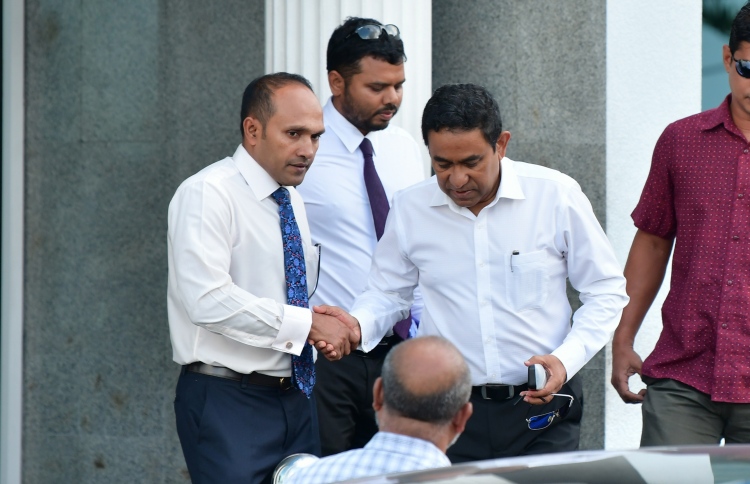Malé, Maldives – Former Vice President of Maldives Dr. Mohamed Jameel Ahmed has said that President Ibrahim Mohamed Solih was pressuring Former President Abdulla Yameen Abdul Gayoom to leave the country.
Dr. Mohamed Jameel, who is also in the legal team of Former President Yameen, told in a tweet he posted earlier today that they had submitted doctors recommendations to change the former president to home arrest so that he could stay in a more ‘stress free’ environment.
While facing additional charges, former President Yameen is currently serving a 5 year money laundering sentence at Maafushi Prison after he was found guilty of crediting one million dollars that was to be received by the state for the lease of Ga. Vodamula, via MMPRC. The verdict was passed by the Criminial Court on 28 November, 2019.
Dr. Jameel criticized the current government for keeping Adeeb and Ziyath, who had been convicted following MMPRC corruption cases, at home arrest though they have been sentenced to jail. After President Solih’s remarks on Adeeb and Ziyath stating that both of them had submitted medical documents which supported them to be changed to house arrest, Dr. Jameel had tweeted asking if the president takes the citizens to be that naive.
Dr. Jameel also accused the government for treating convicts differently for political gains. Backing this claim, Dr. Jameel stated that both Adeeb and Ziyath had been changed to house arrest following the plea agreement made by both of them with the current government to collaborate on the corruption cases of the previous administration.
Ahmed Adeeb (Bro) made a plea agreement with the government on the seven charges filed against him for a jail sentence of 20 years over the Maldives Marketing and Public Relations Corporation (MMPRC) scandal which cost the government more then MVR 4 Billion.
Former Vice President Adeeb who was well known as “Bro” was the most influential minister during the previous administration who rose within the political ranks to be Vice President of the Maldives after an orchestrated no confidence vote of the then Vice President Mohamed Jameel Ahmed who is now again back in the opposition PPM as an advisor.
Adeeb was accused of using state funds which he and his close allies embezzled which he used to bribe politicians, judges and others in high positions in different institutions when he was in the government and he was also well known for funding local gangs.
He was first arrested during the previous administration under the charges of money laundering and trying to kill then-President Abdulla Yameen in 2015 and spent three years in jail before he was transferred to house arrest while at which he tried to flee to India on a tugboat as a stowaway in April 2019 and got arrested by the Indian authorities.
Former Managing Director of Maldives Media and Public Relations Corporation (MMPRC) Abdullah Ziyath had entered a plea bargain with the state in 2020 in which he has agreed to plead guilty for a total of 32 counts, also agreeing to cooperate in a joint investigation.
Ziyath was sentenced to 11 years of imprisonment on December 7, 2020 as he was found guilty of being involved the embezzlement of money by the sale of islands and lagoons. Ziyath was alone involved in the embezzlement of USD 50.7 million (MVR 781 million) of the total potential revenue loss of the graft, which stands at MVR 4 billion.
While Ziyath who was serving an eight-year prison sentence after being convicted of a corruption charge in 2016 in which he embezzled the money received after the sale of Lh.Maabinhura was moved to house arrest in early 2020. He had served 5 years of the total sentence before the most recent sentence of 11 years of imprisonment.
The MMPRC case, which surfaced in 2015, is the largest corruption scandal to rock the Maldives in history. Following initial investigations, the Auditor General’s Office disclosed that MVR 1.2 billion in state funds, acquired via island and lagoon leases, had been embezzled via the corporation, which later increased to MVR 1.4 billion after the investigation by Anti Corruption Commission (ACC).





